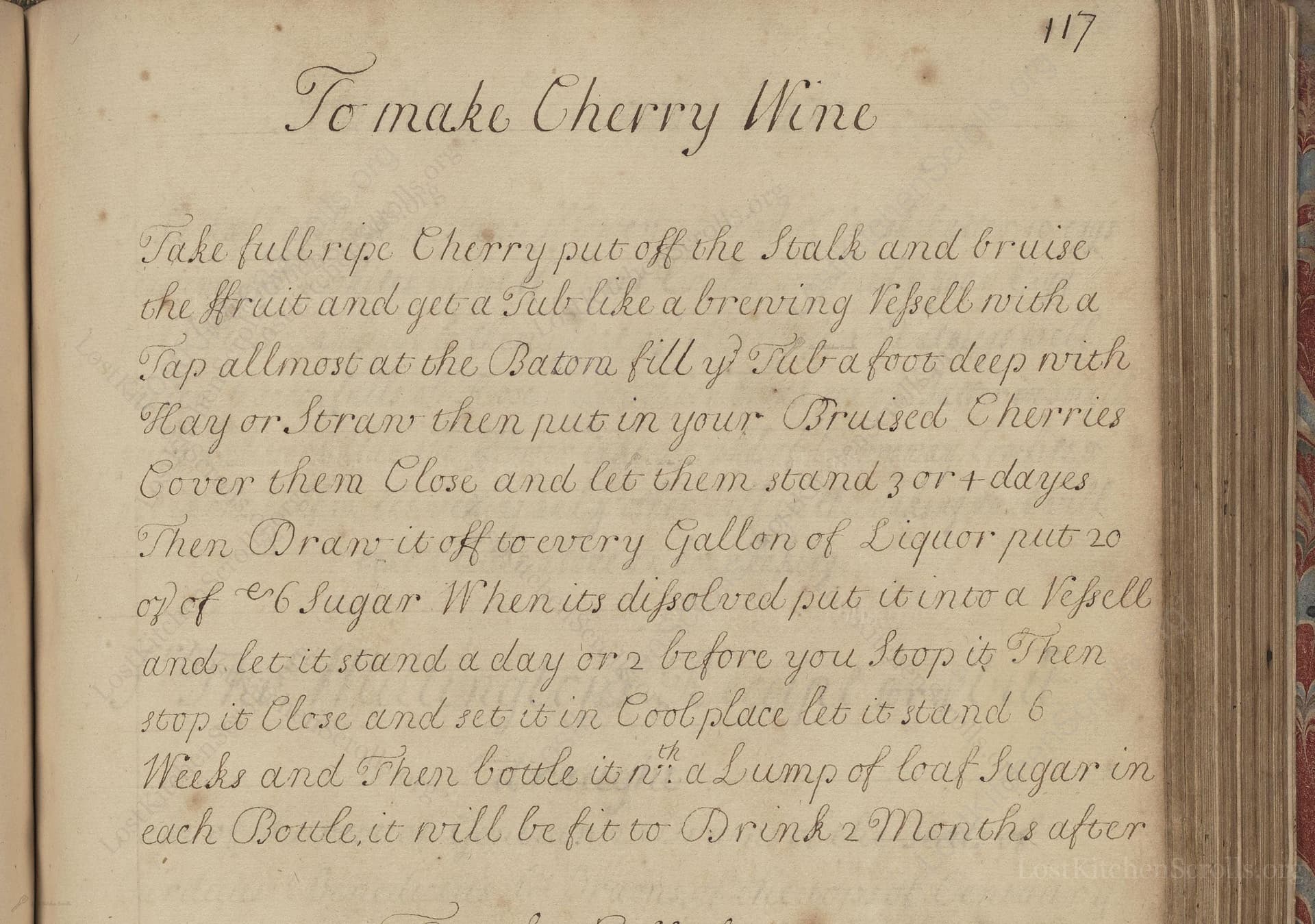To Make Cherry Wine
From the treasured pages of Cookery and medicinal recipes of M.W.
Unknown Author

To Make Cherry Wine
"Take full ripe Cherry put off the Stalk and bruise the fruit and get a Tub like a brewing Vessell with a Tap allmost at the Batom fill yr Tub a foot deep with Hay or Straw then put in your Bruised Cherries Cover them Close and let them stand 3 or 4 dayes Then Draw it off to every Gallon of Liquor put 20 oz of lb Sugar When its disolved put it into a Vessell and let it stand a day or 2 before you Stop it Then stop it Close and set it in Cool place let it stand 6 Weeks and Then bottle it pt a lump of loaf Sugar in each Bottle, it will be fit to Drink 2 Months after"
Note on the Original Text
The recipe is written in the charmingly practical style typical of early modern English household manuscripts. Spelling (like 'yr' for 'your', 'dayes' for 'days', 'liquor' for 'juice/wine') and grammar reflect common usage and idiosyncrasies of the era rather than standardized rules. Measurements are made by the gallon and ounce or pound; it's up to the reader to interpret quantities by experience and context. Instructions are consecutively given, presupposing a certain kitchen know-how. The recipe's sequence prioritizes clarity in action over detailed explanation, teaching through doing.

Title
Cookery and medicinal recipes of M.W. (1775)
You can also click the book image above to peruse the original tome
Writer
Unknown
Era
1775
Publisher
Unknown
Background
A delightful glimpse into British kitchens of yesteryear, this manuscript collection—attributed simply to 'M. W.'—whisks readers through cherished recipes and culinary wisdom passed down between 1700 and 1850. A treasure trove for those who savor the artistry of historical cookery.
Kindly made available by
Folger Shakespeare Library
This cherry wine recipe hails from the manuscript 'V.b.316' by M. W., dating roughly between 1700 and 1850. During this period in Britain, households commonly made fruit wines and cordials as part of their culinary traditions, both to preserve fruit harvests and provide enjoyable beverages year-round. Cherry wine, popular in the Georgian and Victorian eras, is both a sign of the resourcefulness and the experimentation found in domestic kitchens of the time. These manuscripts were typically handwritten collections passed through families, packed with practical recipes that capture the tastes, methods, and materials of their historical moment.

To make this wine in the 18th or early 19th century, you would need a large wooden tub or cask with a tap near the bottom—a standard brewing vessel. Straw or hay was used both as a filter bed and to keep the fruit elevated. A sturdy wooden pestle or similar was used to bruise the cherries. Clean cloths, ceramic or glass bottles sealed with corks, and a source of sugar (then commonly sold in large loaves) rounded out the toolkit. The cool corners of cellars or larders were essential to the fermentation process.
Prep Time
30 mins
Cook Time
0 mins
Servings
20
We've done our best to adapt this historical recipe for modern kitchens, but some details may still need refinement. We warmly welcome feedback from fellow cooks and culinary historians — your insights support the entire community!
Ingredients
- 11 lbs fully ripe cherries (stems removed)
- Clean hay or straw (enough to fill fermentation vessel 12 inches deep)
- 1.5 lbs granulated sugar (or loaf sugar), plus extra for bottles
- Sanitized fermenting tub with a tap
- Bottles for storage
Instructions
- Select fully ripe cherries, remove the stalks, and lightly crush the fruit.
- Line a large fermenting tub fitted with a bottom tap with a layer (about 12 inches deep) of clean hay or straw.
- Pile in the bruised cherries and cover tightly.
- Let ferment at room temperature for 3–4 days.
- Strain off the liquid, then measure it.
- For each quart of cherry juice, dissolve in 5 ounces of granulated sugar.
- Pour the sweetened juice into a sanitized fermenting vessel, cover, and allow to ferment undisturbed for 1–2 days before sealing.
- Place in a cool area for six weeks.
- When fermentation is complete, decant into bottles, adding a small cube (about 0.18 oz) of loaf sugar to each.
- The wine will be ready to drink after two months of aging.
Estimated Calories
200 per serving
Cooking Estimates
You will spend about 30 minutes washing, stemming, and crushing the cherries before setting them up for fermentation. There's no actual cooking, but you should plan for about 4 days for the first fermentation stage and 6 weeks of aging. Each 200 ml serving has around 200 calories, and the recipe makes about 20 servings.
As noted above, we have made our best effort to translate and adapt this historical recipe for modern kitchens, taking into account ingredients nowadays, cooking techniques, measurements, and so on. However, historical recipes often contain assumptions that require interpretation.
We'd love for anyone to help improve these adaptations. Community contributions are highly welcome. If you have suggestions, corrections, or cooking tips based on your experience with this recipe, please share them below.
Join the Discussion
Rate This Recipe
Dietary Preference
Main Ingredients
Culinary Technique

Den Bockfisch In Einer Fleisch Suppen Zu Kochen
This recipe hails from a German manuscript cookbook compiled in 1696, a time whe...

Die Grieß Nudlen Zumachen
This recipe comes from a rather mysterious manuscript cookbook, penned anonymous...

Ein Boudain
This recipe comes from an anonymous German-language manuscript cookbook from 169...

Ein Gesaltzen Citroni
This recipe, dating from 1696, comes from an extensive anonymous German cookbook...
Browse our complete collection of time-honored recipes



